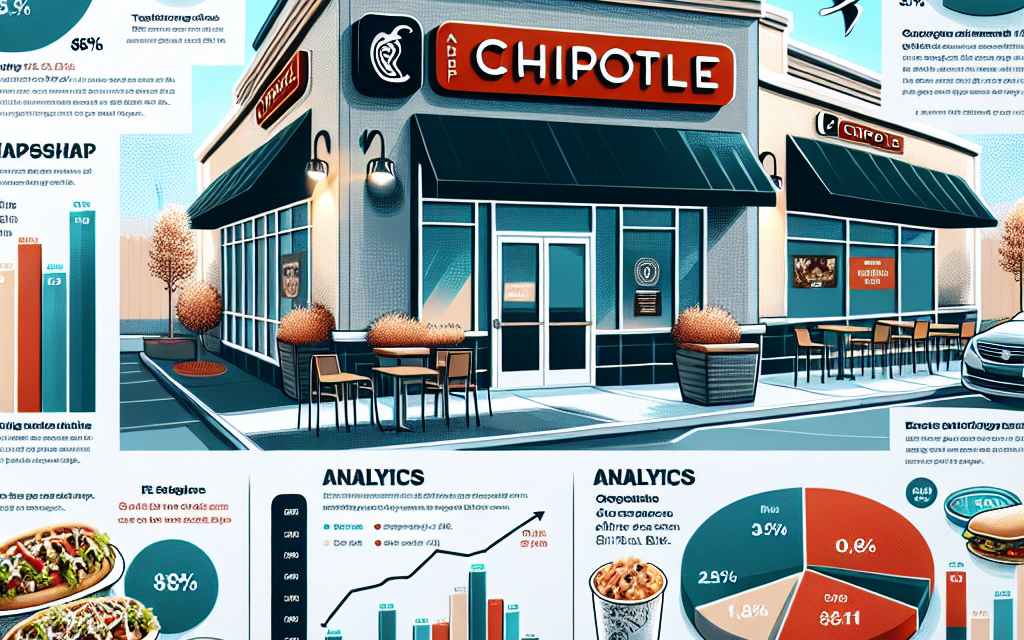“Unwrap the Flavor of Financial Growth: Key Insights on Chipotle Stock Investment”
Introduction
Investing in Chipotle Mexican Grill, Inc. (NYSE: CMG) requires a comprehensive understanding of the company’s business model, market position, and growth prospects. As a leader in the fast-casual dining segment, Chipotle has distinguished itself with a commitment to high-quality ingredients and a focus on sustainability. The company’s innovative approach to menu offerings and its digital transformation efforts have been pivotal in driving customer engagement and operational efficiency. Additionally, Chipotle’s financial health, characterized by strong revenue growth and profitability, underscores its resilience in a competitive industry. However, potential investors should also consider challenges such as fluctuating commodity prices, labor costs, and regulatory compliance. By analyzing these essential insights, investors can make informed decisions about the potential risks and rewards associated with investing in Chipotle’s stock.
Understanding Chipotle’s Business Model
Chipotle Mexican Grill, Inc. has emerged as a prominent player in the fast-casual dining sector, captivating investors with its unique business model and consistent growth. Understanding Chipotle’s business model is crucial for potential investors seeking to make informed decisions. At the core of Chipotle’s success is its commitment to serving “Food with Integrity,” a philosophy that emphasizes the use of high-quality, responsibly sourced ingredients. This commitment not only differentiates Chipotle from its competitors but also resonates with a growing segment of health-conscious consumers who prioritize sustainability and ethical sourcing.
Transitioning from its foundational principles, Chipotle’s operational strategy further underscores its business model. The company employs a streamlined menu, focusing on a limited number of customizable items such as burritos, bowls, tacos, and salads. This simplicity allows for efficient operations, reducing wait times and minimizing food waste. Moreover, the customizable nature of the menu caters to diverse dietary preferences, enhancing its appeal to a broad customer base. By maintaining a consistent and straightforward menu, Chipotle can ensure quality control and operational efficiency across its numerous locations.
In addition to its menu strategy, Chipotle’s emphasis on digital innovation has been a significant driver of its recent growth. The company has invested heavily in its digital infrastructure, enhancing its mobile app and online ordering system to provide a seamless customer experience. This digital focus has been particularly advantageous in adapting to changing consumer behaviors, especially during the COVID-19 pandemic, when online ordering and delivery services became essential. The integration of technology into its business model not only boosts sales but also provides valuable data insights, enabling Chipotle to refine its marketing strategies and improve customer engagement.
Furthermore, Chipotle’s strategic expansion efforts play a vital role in its business model. The company has been methodically increasing its footprint, both domestically and internationally, with a focus on high-traffic urban areas and suburban markets. This expansion strategy is supported by a robust site selection process that considers factors such as demographics, competition, and accessibility. By carefully selecting new locations, Chipotle can maximize its market penetration while maintaining brand integrity and operational standards.
Another critical aspect of Chipotle’s business model is its commitment to sustainability and corporate social responsibility. The company has set ambitious goals to reduce its environmental impact, such as achieving carbon neutrality and minimizing waste. These initiatives not only align with consumer values but also position Chipotle as a leader in sustainable business practices within the fast-casual dining industry. This commitment to sustainability can enhance brand loyalty and attract environmentally conscious investors.
In conclusion, Chipotle’s business model is a multifaceted approach that combines a commitment to quality ingredients, operational efficiency, digital innovation, strategic expansion, and sustainability. Each element of this model contributes to the company’s competitive advantage and long-term growth potential. For investors, understanding these components is essential to evaluating Chipotle’s position in the market and its prospects for future success. As the company continues to evolve and adapt to changing consumer preferences, its business model remains a testament to its resilience and vision in the fast-casual dining sector.
Analyzing Chipotle’s Financial Performance
When considering an investment in Chipotle Mexican Grill, Inc., it is crucial to analyze the company’s financial performance to make an informed decision. Chipotle, a prominent player in the fast-casual dining sector, has demonstrated significant growth over the years, making it an attractive option for investors. However, understanding the nuances of its financial health is essential to gauge its potential for future success.
To begin with, Chipotle’s revenue growth is a key indicator of its financial performance. The company has consistently reported increasing revenues, driven by its strategic expansion and innovative menu offerings. This growth is further supported by Chipotle’s ability to attract a loyal customer base, which is evident in its strong same-store sales figures. By focusing on quality ingredients and a unique dining experience, Chipotle has managed to differentiate itself from competitors, thereby sustaining its revenue momentum.
In addition to revenue growth, profitability is another critical aspect to consider. Chipotle has shown resilience in maintaining healthy profit margins despite facing challenges such as rising food costs and labor expenses. The company’s ability to manage these costs effectively while still delivering a high-quality product is a testament to its operational efficiency. Moreover, Chipotle’s investment in technology, such as digital ordering and delivery services, has not only enhanced customer convenience but also contributed to improved profitability by streamlining operations.
Furthermore, Chipotle’s balance sheet strength is an important factor for potential investors. The company has maintained a solid financial position with minimal debt, which provides it with the flexibility to invest in growth opportunities and weather economic downturns. This financial stability is complemented by a strong cash flow, enabling Chipotle to fund its expansion plans and return value to shareholders through share repurchases.
Transitioning to the competitive landscape, Chipotle operates in a highly competitive industry with numerous players vying for market share. However, the company’s strong brand recognition and commitment to sustainability have given it a competitive edge. Chipotle’s emphasis on responsibly sourced ingredients and environmental initiatives resonates with a growing segment of consumers who prioritize ethical consumption. This focus not only enhances its brand image but also positions Chipotle favorably in an increasingly conscious market.
Moreover, Chipotle’s strategic initiatives aimed at expanding its footprint both domestically and internationally are worth noting. The company has been actively opening new locations and exploring untapped markets, which could drive future revenue growth. Additionally, Chipotle’s menu innovation, including the introduction of new items and limited-time offerings, keeps the brand fresh and appealing to a diverse customer base.
However, it is important to acknowledge potential risks associated with investing in Chipotle. The company operates in a sector susceptible to economic fluctuations, which can impact consumer spending on dining out. Additionally, food safety concerns, although addressed through stringent measures, remain a potential risk factor that could affect Chipotle’s reputation and financial performance.
In conclusion, Chipotle’s financial performance presents a compelling case for investment, characterized by robust revenue growth, strong profitability, and a solid balance sheet. The company’s strategic initiatives and competitive advantages further bolster its potential for long-term success. Nevertheless, investors should remain cognizant of the inherent risks and market dynamics that could influence Chipotle’s future trajectory. By carefully weighing these factors, potential investors can make a well-informed decision regarding their investment in Chipotle Mexican Grill, Inc.
Evaluating Chipotle’s Market Position
When considering an investment in Chipotle Mexican Grill, it is crucial to evaluate the company’s market position, as this provides valuable insights into its potential for growth and profitability. Chipotle has established itself as a prominent player in the fast-casual dining sector, a segment that has been expanding rapidly due to changing consumer preferences. The brand’s commitment to high-quality ingredients and sustainable sourcing has resonated well with health-conscious consumers, setting it apart from traditional fast-food chains. This differentiation has been a key driver of Chipotle’s success, allowing it to capture a significant share of the market.
Moreover, Chipotle’s strategic initiatives have further solidified its market position. The company has been proactive in embracing digital transformation, which has become increasingly important in the restaurant industry. By investing in its digital platform and enhancing its mobile app, Chipotle has improved the customer experience, making it more convenient for consumers to place orders and access promotions. This focus on digital innovation has not only increased customer engagement but also boosted sales, particularly during the COVID-19 pandemic when online ordering became a necessity.
In addition to its digital efforts, Chipotle has been expanding its footprint through the opening of new locations. The company’s growth strategy involves targeting both urban and suburban areas, thereby broadening its reach and tapping into new customer bases. This expansion is supported by a strong brand reputation and a loyal customer following, which are critical components of Chipotle’s market position. Furthermore, the introduction of drive-thru lanes, known as “Chipotlanes,” has enhanced the convenience factor, attracting more customers and increasing throughput at existing locations.
Another aspect to consider when evaluating Chipotle’s market position is its financial performance. The company has demonstrated robust revenue growth and profitability, driven by its ability to adapt to market trends and consumer demands. Chipotle’s focus on operational efficiency and cost management has enabled it to maintain healthy margins, even in the face of rising food and labor costs. This financial resilience is indicative of a strong market position, as it suggests that Chipotle can weather economic fluctuations and continue to deliver value to shareholders.
However, it is important to acknowledge the challenges that Chipotle faces in maintaining its market position. The fast-casual dining sector is highly competitive, with numerous players vying for market share. To stay ahead, Chipotle must continue to innovate and differentiate itself from competitors. Additionally, the company must navigate potential risks related to food safety and supply chain disruptions, which could impact its reputation and financial performance.
In conclusion, Chipotle’s market position is characterized by a strong brand identity, strategic growth initiatives, and solid financial performance. These factors contribute to its competitive advantage in the fast-casual dining sector. Nevertheless, potential investors should remain cognizant of the challenges and risks that could affect Chipotle’s market position in the future. By carefully evaluating these elements, investors can make informed decisions about the potential of Chipotle as an investment opportunity. As the company continues to evolve and adapt to changing market dynamics, its ability to sustain and enhance its market position will be a key determinant of its long-term success.
Assessing Chipotle’s Growth Strategies

When considering an investment in Chipotle Mexican Grill, it is crucial to assess the company’s growth strategies, as these are pivotal in determining its future performance and potential returns. Chipotle has consistently demonstrated a commitment to innovation and expansion, which has been instrumental in its success. To begin with, one of the primary growth strategies employed by Chipotle is its focus on menu innovation. The company has continually introduced new items that cater to evolving consumer preferences, such as lifestyle bowls and plant-based options. This adaptability not only attracts a broader customer base but also enhances customer loyalty by offering diverse choices that align with current dietary trends.
Moreover, Chipotle’s emphasis on digital transformation has significantly contributed to its growth trajectory. The company has invested heavily in its digital infrastructure, including a user-friendly mobile app and an efficient online ordering system. This digital push has been particularly beneficial during the COVID-19 pandemic, as it allowed Chipotle to maintain strong sales through takeout and delivery services. The seamless integration of technology into its operations has not only improved customer convenience but also increased operational efficiency, thereby boosting profitability.
In addition to digital advancements, Chipotle’s strategic expansion of its physical footprint is another critical component of its growth strategy. The company has been methodically opening new locations, both domestically and internationally, to capture a larger market share. This expansion is carefully planned, with a focus on high-traffic areas that promise substantial customer flow. By doing so, Chipotle ensures that each new outlet has the potential to contribute positively to the company’s overall revenue.
Furthermore, Chipotle’s commitment to sustainability and ethical sourcing is a distinguishing factor that enhances its brand image and attracts socially conscious consumers. The company has made significant strides in sourcing ingredients responsibly and reducing its environmental impact. This commitment not only aligns with the values of a growing segment of consumers but also positions Chipotle as a leader in corporate responsibility within the fast-casual dining sector.
Another aspect worth noting is Chipotle’s investment in employee development and retention. The company recognizes that a motivated and well-trained workforce is essential for delivering exceptional customer service and maintaining operational excellence. By offering competitive wages, comprehensive benefits, and opportunities for career advancement, Chipotle fosters a positive work environment that translates into better service and, ultimately, customer satisfaction.
While these growth strategies are promising, potential investors should also be aware of the challenges Chipotle faces. The company operates in a highly competitive industry, with numerous players vying for market share. Additionally, fluctuations in food costs and supply chain disruptions can impact profitability. Therefore, it is essential for investors to consider these risks alongside the company’s growth strategies.
In conclusion, Chipotle’s growth strategies, characterized by menu innovation, digital transformation, strategic expansion, sustainability efforts, and employee development, present a compelling case for investment. However, as with any investment, it is important to conduct thorough research and consider both the opportunities and challenges that may affect the company’s future performance. By doing so, investors can make informed decisions that align with their financial goals and risk tolerance.
Examining Chipotle’s Competitive Landscape
When considering an investment in Chipotle Mexican Grill, Inc., it is crucial to examine the competitive landscape in which the company operates. Chipotle, a prominent player in the fast-casual dining sector, has carved out a significant niche by offering a menu centered around fresh, high-quality ingredients and customizable options. However, understanding the dynamics of its competitive environment is essential for potential investors seeking to make informed decisions.
To begin with, Chipotle faces competition from both direct and indirect competitors. Direct competitors include other fast-casual chains such as Qdoba Mexican Eats, Moe’s Southwest Grill, and Baja Fresh. These brands offer similar menu items and dining experiences, vying for the same customer base. Each competitor has its unique selling propositions, such as Qdoba’s emphasis on flavor variety and Moe’s focus on a fun, family-friendly atmosphere. Consequently, Chipotle must continuously innovate and differentiate itself to maintain its market position.
In addition to direct competitors, Chipotle contends with indirect competition from fast-food giants like Taco Bell and McDonald’s. These companies, with their extensive resources and established brand recognition, pose a significant threat. Taco Bell, for instance, offers a wide range of Mexican-inspired dishes at lower price points, appealing to budget-conscious consumers. Meanwhile, McDonald’s, with its global reach and diverse menu, attracts a broad demographic. Chipotle’s challenge lies in convincing customers that its higher price point is justified by superior quality and a more personalized dining experience.
Moreover, the competitive landscape is further complicated by the rise of health-conscious consumers. As more people prioritize healthy eating, Chipotle’s commitment to using fresh, responsibly sourced ingredients becomes a critical competitive advantage. However, this trend also invites competition from health-focused fast-casual chains like Sweetgreen and Cava, which emphasize nutritious, customizable meals. These brands appeal to the same demographic that values Chipotle’s food philosophy, necessitating that Chipotle continuously reinforces its commitment to quality and sustainability.
Furthermore, the digital transformation of the restaurant industry has introduced new competitive dynamics. The increasing importance of online ordering and delivery services has led to partnerships with third-party platforms like DoorDash and Uber Eats. While these partnerships expand Chipotle’s reach, they also introduce competition from virtual kitchens and delivery-only brands that operate with lower overhead costs. To stay competitive, Chipotle has invested in its digital infrastructure, enhancing its app and loyalty program to improve customer engagement and streamline the ordering process.
In light of these competitive pressures, Chipotle’s strategic initiatives play a pivotal role in maintaining its market position. The company’s focus on menu innovation, such as the introduction of new protein options and limited-time offerings, helps attract and retain customers. Additionally, Chipotle’s emphasis on sustainability and ethical sourcing resonates with environmentally conscious consumers, further differentiating it from competitors.
In conclusion, examining Chipotle’s competitive landscape reveals a complex interplay of direct and indirect competitors, evolving consumer preferences, and technological advancements. For potential investors, understanding these dynamics is essential to assess Chipotle’s ability to navigate challenges and capitalize on opportunities. By maintaining its commitment to quality, innovation, and sustainability, Chipotle aims to strengthen its competitive position and deliver long-term value to shareholders. As the fast-casual dining sector continues to evolve, Chipotle’s strategic responses to these competitive forces will be crucial in determining its future success.
Investigating Chipotle’s Supply Chain Management
When considering an investment in Chipotle Mexican Grill, Inc., understanding the intricacies of its supply chain management is crucial. Chipotle’s supply chain is a fundamental component of its business model, directly impacting its operational efficiency, cost management, and overall brand reputation. As a company that prides itself on serving “food with integrity,” Chipotle’s supply chain strategy is deeply intertwined with its commitment to sourcing high-quality, responsibly raised ingredients. This commitment not only differentiates Chipotle from its competitors but also presents unique challenges and opportunities for investors to consider.
To begin with, Chipotle’s supply chain is characterized by its focus on sustainability and ethical sourcing. The company sources a significant portion of its ingredients from local and organic farms, which supports its brand promise of offering fresh and natural food options. This approach, while appealing to a growing segment of health-conscious consumers, requires a robust and flexible supply chain capable of adapting to the variability of local agricultural production. Consequently, Chipotle’s supply chain management must be adept at navigating the complexities of working with numerous small-scale suppliers, which can introduce variability in supply and pricing.
Moreover, Chipotle’s emphasis on ethical sourcing extends to its commitment to animal welfare. The company has established rigorous standards for the treatment of animals, which it enforces through regular audits and partnerships with suppliers who share its values. This focus on humane practices not only enhances Chipotle’s brand image but also necessitates a careful selection of suppliers who can meet these stringent requirements. As a result, Chipotle’s supply chain management must maintain strong relationships with its suppliers to ensure compliance and continuity of supply, which can be a challenging task given the limited number of suppliers who meet these high standards.
In addition to ethical considerations, Chipotle’s supply chain management is also focused on efficiency and cost-effectiveness. The company employs a centralized distribution model, which allows it to streamline operations and reduce costs. By consolidating its purchasing power, Chipotle can negotiate better prices for its ingredients, thereby enhancing its profit margins. However, this centralized approach also requires a sophisticated logistics network to ensure timely delivery of fresh ingredients to its numerous locations. Any disruptions in this network, whether due to natural disasters, transportation issues, or supplier shortages, can have significant repercussions on Chipotle’s operations and financial performance.
Furthermore, Chipotle’s supply chain management is increasingly leveraging technology to enhance its efficiency and transparency. The company has invested in digital tools and platforms that enable real-time tracking of inventory and supply chain activities. This technological integration not only improves operational efficiency but also provides valuable data insights that can inform strategic decision-making. For investors, Chipotle’s commitment to technological innovation in its supply chain is a positive indicator of the company’s ability to adapt to changing market conditions and consumer preferences.
In conclusion, Chipotle’s supply chain management is a critical aspect of its business that directly influences its operational success and brand reputation. The company’s focus on sustainability, ethical sourcing, and efficiency presents both challenges and opportunities for investors. By understanding the complexities and strategic initiatives within Chipotle’s supply chain, investors can gain valuable insights into the company’s potential for long-term growth and resilience in the competitive fast-casual dining industry. As such, a thorough evaluation of Chipotle’s supply chain management practices is essential for making informed investment decisions.
Reviewing Chipotle’s Corporate Social Responsibility Initiatives
When considering an investment in Chipotle Mexican Grill, Inc., it is crucial to examine the company’s corporate social responsibility (CSR) initiatives, as these efforts can significantly impact its reputation, customer loyalty, and long-term financial performance. Chipotle has long been recognized for its commitment to sustainability and ethical practices, which are integral components of its business model. By understanding these initiatives, potential investors can gain valuable insights into the company’s values and operational strategies.
To begin with, Chipotle’s approach to sourcing ingredients is a cornerstone of its CSR strategy. The company is dedicated to using responsibly sourced, high-quality ingredients, which aligns with its “Food with Integrity” philosophy. This commitment involves working closely with farmers and suppliers to ensure that the ingredients used in its restaurants are sustainably grown and ethically produced. For instance, Chipotle prioritizes sourcing meats from animals that are raised without the use of antibiotics or added hormones, and it supports local and organic farming practices whenever possible. This focus on sustainable sourcing not only enhances the quality of its menu offerings but also appeals to a growing segment of environmentally conscious consumers.
In addition to its sourcing practices, Chipotle is actively engaged in reducing its environmental footprint. The company has implemented various initiatives aimed at minimizing waste, conserving energy, and reducing greenhouse gas emissions. For example, Chipotle has invested in energy-efficient restaurant designs and equipment, as well as waste reduction programs that include composting and recycling efforts. Furthermore, the company is committed to achieving its ambitious goal of reducing its carbon footprint by 50% by 2030. These environmental initiatives demonstrate Chipotle’s proactive approach to addressing climate change and its dedication to operating as a responsible corporate citizen.
Moreover, Chipotle’s CSR efforts extend beyond environmental sustainability to include social initiatives that support its employees and communities. The company is known for offering competitive wages and benefits to its workforce, as well as providing opportunities for career advancement through its internal development programs. Chipotle’s commitment to employee well-being is further exemplified by its focus on creating a diverse and inclusive workplace. The company has implemented various diversity and inclusion initiatives, such as unconscious bias training and employee resource groups, to foster a culture of respect and equality.
Additionally, Chipotle is actively involved in community engagement and philanthropy. The company supports numerous charitable organizations and initiatives, with a particular emphasis on food insecurity and education. Through its Chipotle Cultivate Foundation, the company provides grants to support sustainable agriculture, family farming, and culinary education programs. These philanthropic efforts not only contribute to the well-being of communities but also enhance Chipotle’s brand image and strengthen its relationships with stakeholders.
In conclusion, Chipotle’s corporate social responsibility initiatives are a testament to its commitment to ethical and sustainable business practices. By prioritizing responsible sourcing, environmental stewardship, employee well-being, and community engagement, Chipotle has positioned itself as a leader in the fast-casual dining industry. For investors, these initiatives offer valuable insights into the company’s long-term strategic vision and its potential to generate sustainable growth. As such, understanding Chipotle’s CSR efforts is essential for making informed investment decisions and assessing the company’s ability to navigate the evolving landscape of consumer expectations and regulatory requirements.
Q&A
1. **What is Chipotle’s business model?**
Chipotle operates a fast-casual restaurant chain specializing in Mexican cuisine, focusing on high-quality ingredients, customizable menu options, and a commitment to sustainability and ethical sourcing.
2. **How has Chipotle’s financial performance been recently?**
Chipotle has shown strong financial performance with consistent revenue growth, driven by strategic menu innovations, digital sales expansion, and effective cost management.
3. **What are the key growth strategies for Chipotle?**
Key growth strategies include expanding digital and delivery services, opening new restaurant locations, enhancing menu offerings, and leveraging loyalty programs to increase customer engagement.
4. **What are the main risks associated with investing in Chipotle?**
Risks include food safety concerns, supply chain disruptions, competition in the fast-casual sector, and potential regulatory changes impacting labor and food sourcing.
5. **How does Chipotle address sustainability and ethical sourcing?**
Chipotle emphasizes sustainability by sourcing organic and local produce, using responsibly raised meat, and implementing environmentally friendly practices in its operations.
6. **What is Chipotle’s competitive advantage?**
Chipotle’s competitive advantage lies in its strong brand reputation, commitment to quality ingredients, efficient operational model, and successful digital transformation.
7. **How does Chipotle leverage technology in its operations?**
Chipotle leverages technology through its mobile app, online ordering system, and digital kitchen concepts to enhance customer experience, streamline operations, and drive sales growth.
Conclusion
Chipotle Mexican Grill, Inc. (CMG) has established itself as a prominent player in the fast-casual dining sector, known for its commitment to high-quality ingredients and sustainable practices. Before investing in Chipotle stock, it’s essential to consider several key insights. Firstly, Chipotle’s strong brand loyalty and innovative menu offerings have driven consistent revenue growth, even amidst industry challenges. The company’s focus on digital transformation, including online ordering and delivery services, has expanded its customer base and improved operational efficiency. Additionally, Chipotle’s strategic expansion plans, both domestically and internationally, present significant growth opportunities. However, potential investors should be mindful of risks such as food safety concerns, fluctuating commodity prices, and competitive pressures from other fast-casual and quick-service restaurants. Overall, Chipotle’s robust business model, coupled with its adaptability to changing consumer preferences, positions it as a compelling investment opportunity, albeit with inherent risks that require careful consideration.





